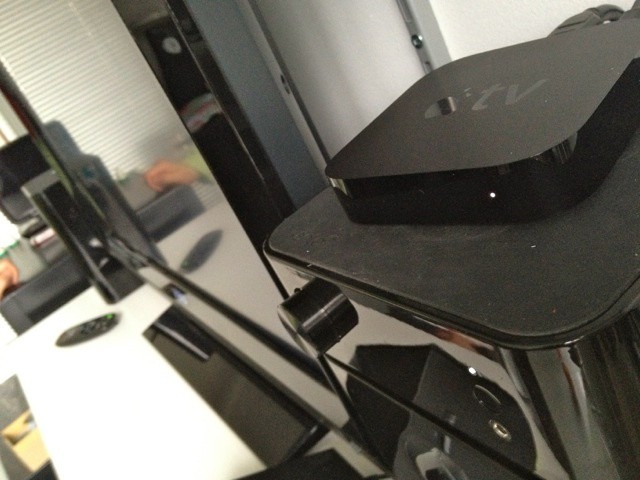Rumors have been saying for many, many months that Apple is working on a standalone TV set (dubbed ‘iTV’) that will revolutionize the way we consume media from traditional content providers and the internet. Steve Jobs himself added more fuel to the fire when he told biographer Walter Isaacson that he had “finally cracked it,” referring to an integrated TV set. He wasn’t talking about the black set-top box Apple currently sells for $99.
Questions have been raised regarding the plausibility of Apple releasing its own TV set. Is this an example of the rumor mill spiraling out of control, or is Apple actually planning a full-on assault to take over the living room?
If there’s any one source who has been mainly responsible for feeding Apple TV rumors over the past few years, it’s Piper Jaffray’s senior Apple analyst Gene Munster. In case you didn’t know, analysts are industry watchdogs who are paid to publish forecasts about sales and future company plans. Before Apple releases official sales numbers for a business quarter or announces a new product, analysts will send out number estimates and “informed” speculation. Most of the time they are wrong, but sometimes they are right.
Gene Munster, a lover of Apple who was recently profiled by Bloomberg Businessweek, has been following Apple closely for nearly a decade. Munster advised people to invest in Apple way back in 2004 when AAPL stock hovered around $16. He started the Apple television speculation back in February of 2009:
Such a device would command a premium among a competitive field of budget TVs; we believe Apple could differentiate itself with software that makes home entertainment simple and solves a pain point for consumers (complicated TV and component systems).
Years later, and Munster reveals to Bloomberg why he initially started banging the Apple TV drum:
“Somebody close to Apple said we needed to be doing more work on the television and that started it all,” he says. “You start with these crumb trails, then it turns into a dirt road, and now it’s a paved road.”
Fortune seems to think that Munster and Piper Jaffray may have gotten the iTV rumor wrong. Here are the reasons cited by Fortune:
- The market is crowded with low-cost producers.
- The margins are terrible.
- The machines are big and heavy and often require professional installation.
- They need large retail display areas and lots of warehouse space.
- There’s no single global market. (It’s NTSC in the U.S., PAL in Europe.)
- People tend hold on to the TVs for decades. (Apple prefers to sell products that get frequently replaced — every two years for iPhones, every three years or so for Macs.)
- Dealing with the cable companies that control the local delivery of content is like dealing with mob.
There are rebuttals for every single one of these arguments:
- The Mac has always been sold in a crowded market of low-cost PC producers.
- TV margins are terrible, but if there’s any company that can find a way to make a product profitable, it’s Apple.
- Whatever Apple makes will be thin, elegant, and very easy to install. Your mom will be able to get it working. That’s just the way Apple stuff works.
- Imagine a wall section in every Apple Store where three different sizes of Apple TV sets hang. Like the Macs on display, video reels would play highlighting the TV’s features. Apple would also package the thing super minimally, thereby minimizing storage space requirements.
- There isn’t a single global market, but that never stopped the iPhone from being available in over 70 countries. The smartphone industry is very convoluted and fragmented throughout different countries around the world.
- Diehard fans will buy an Apple-branded TV the moment it’s available, and many, many others will also undoubtedly buy it. Apple doesn’t do something if it doesn’t expect it to sell. And even then, it’s not like Apple couldn’t afford to take a gamble right now.
- Steve Jobs pressured the music industry into partnering with iTunes when music piracy was a looming threat, and now Hollywood is worried about piracy. Sounds like the same mob deal all over again.
The point is that, at this stage in the Apple TV rumor cycle, every argument can be turned around and used for another opinion. There is no hard, empirical evidence that Apple is planning a TV set, and there’s no hard evidence to say otherwise. There does come a point, however, where enough chatter means something. Supply chain rumors and pundit speculation would not be continuing to surface years later if Apple wasn’t about to move into the TV space in a new way.
Skeptics think that Apple will just release a beefier Apple TV hockey puck and call it a day. No way. Something is coming, and the rest of the industry is sweating and trying to top a product that hasn’t even been announced yet. We’ve heard that gaming will be a part of the equation. Siri integration and IP-based TV is also expected.
Apple is about creating an ecosystem of products that all carry the Apple logo and compliment each other. A little set-top box you have to hook up to your HDTV does not fit in with that longterm vision.


